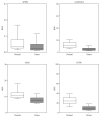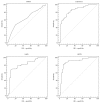Functional Epigenetic Analysis of Prostate Carcinoma: A Role for Seryl-tRNA Synthetase?
- PMID: 26317032
- PMCID: PMC4437382
- DOI: 10.1155/2014/362164
Functional Epigenetic Analysis of Prostate Carcinoma: A Role for Seryl-tRNA Synthetase?
Abstract
Transcriptional silencing, as a result of aberrant promoter hypermethylation, is a common mechanism through which genes in cancer cells become inactive. Functional epigenetic screens using demethylating agents to reexpress transcriptional silenced genes may identify such inactivated genes for needing further evaluation. We aimed to identify genes so far not known to be inactivated by promoter hypermethylation in prostate cancer. DU-145 and LNCaP cells were treated with the DNMT inhibitor zebularine. Expression changes of total RNA from treated and untreated cells were compared using an RNA expression microarray. Genes upregulated more than 2-fold were evaluated by RT-qPCR in 50 cases of paired normal and tumor tissues of prostate cancer patients. SARS was found to be downregulated in prostate cancer in 42/50 cases (84%). In addition, GADD45A and SPRY4 showed a remarkable diminished expression (88% and 74%, resp.). The gold standard for promoter hypermethylation-inactivated genes in prostate cancer (GSTP1) was repressed in 90% of our patient samples. ROC analyses reported statistically significant AUC curves in SARS, GADD45A, and GSTP1 and positive Spearman correlations were found between these genes. SARS was discovered to be a novel gene that is repressed in prostate cancer and could therefore be recommended for its involvement in prostate carcinogenesis.
Figures



References
-
- Ferlay J., Soerjomataram I., Ervik M., et al. GLOBOCAN, 2012 V1. 0, Cancer Incidence and Mortality Worldwide: IARC CancerBase No. 11 [Internet] Lyon, France: International Agency for Research on Cancer; 2013.
LinkOut - more resources
Full Text Sources
Other Literature Sources
Research Materials
Miscellaneous

